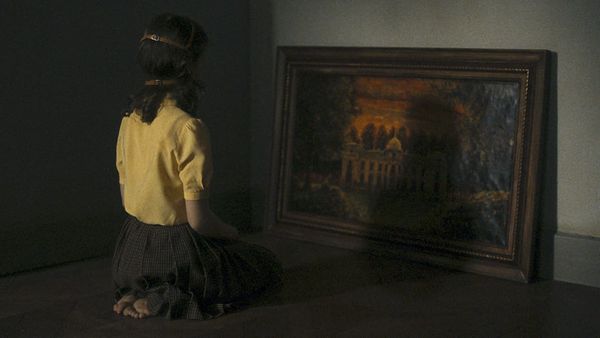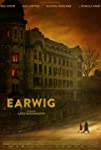Eye For Film >> Movies >> Earwig (2021) Film Review
Earwig
Reviewed by: Andrew Robertson

There is a moment very near the end of Earwig where the camera rotates on more than one axis, a headlong and multidimensional inversion that forces us to a new perspective as we approach conclusion. It comes after a long unfolding, a slow litany of events. Each as carefully wrapped as individual pieces of broken glass in brown paper, edges that have not been made safe as much as obfuscated. From the beginning it has been clear that something is going to happen. That is part of the bargain of film, the unspoken compact.
Things happen all the time, but something happening is a story.
There are other deals here, other rituals. From the opening credits which invoke a particular old-fashioned sensibility, artificial artefacts of an artful archness. Drop-shadowed fonts on a green marbled background, gilt edges forming an extended heptagon, a single point at the top, truncated to flatness at the bottom. Truncated to flatness. Adapted from Brian Catling's novel with a tone that reflects some of its unhinged formality (one character is described as possessing a "Dracularian elegance") the beginnings are the same but what's in the middle isn't.
Albert Scellinc is made of Aalbert Scellinc, Liege becomes, I think, Dundee of the 1950s. The very early 1950s, near the end of the month and by extension the beginning. Or perhaps somewhere else, an intractable metropolis possessed of proximate wooded watercourse and domestic electricities and places for respite balanced at distances of discretion and dispatch. An inescapable metropolis because even outwith what might be borders the metropolity extends its metropolitan metrotendrils to enact its metropolitaneeds with the certainty of a metropolitametronome. Ticks follow tocks. Sickness follows shocks.
Paul Hilton is our Albert, one of them. Romane Hemelaers in a début role that draws from comfort and discomfort and order and disorder. Adults around her appear to insist on regarding her as object, task, but even with minimal dialogue there is a sense of the child within the contracts, between the doors. This is Lucile Hadzihalilovic's third feature, one whose surety speaks (albeit quietly) to her talent. She is assisted in adapting the novel by previous collaborator Geoff Cox. They have not so much filed down the weirdness as let it melt a little. This is still a film that features a girl with teeth made of ice, the caretaker whose equilibrium is punctured by thin pipes that "giggled with ice." That last a line also noted by Warren Ellis, another polymath and sometime novelist, who is mentioned here because he produced the score, Nicholas Becker's musical work may be more familiar than Ellis from The Sound Of Metal.
It is an achievement to find as many old faces. Even fresh ones like Nicholas Lawther carry something of a bygone era beyond the suspicious pencil moustaches. Throughout production design and costume and more give a sense of time and place that feels like memory, a timelessness of five minutes more. The title is from 'eavesdrop' but we are more than listening in, we are watching, waiting. Things happen, but we know that something is going to happen. We know that things have happened, but more climactically, something has happened. That's part of the bargain of film.
I found myself bound up in detail, reminded of other things. Another novel with string and butcher rolls, made film, Patrick McGrath and latterly David Cronenberg's Spider. That has one era bleeding into another, but here the introduction of violence is not just a creeping olfactory thing but a sudden immersion. Phonetic, if not misophonic, cousin to that sudden inversion. "It's a lie," a declaration after another, but so is all fiction. That doesn't mean it isn't true.
Earwig invites you to listen, to put out feelers, to scurry. There is enough to drink it all in, like a man drowning, the floors wet with industry. The watched pot boils. It is not the only source of pressure. One of the great delights of novels which we still call that centuries later is the way that language conjures feelings, the way that in one cranial prison a nest of electrons and chemicals fires and through processes mechanical and meaty makes another set of both that catches light from trees that have been sliced and sliced and sliced and bounces it back differently cut out to in a different castle of the mind trigger chemicals and electrical fires and there the feeling kindled conjured anew. The language of cinema is different but no less satisfactory, the ring of off-screen telephone the treat of step and the play of light. From different sources and different bounces but no less reflective, no less shadowed, no less dark. To adapt a work is a process of translation, of reconstruction in a new media. The glass has teeth.
Reviewed on: 15 Aug 2022















